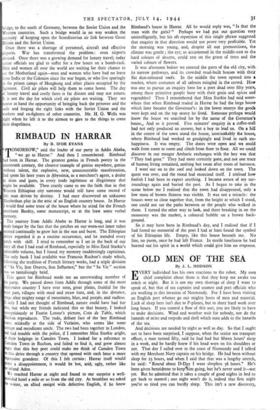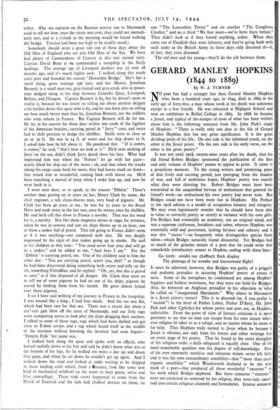OLD MEN OF THE SEA
By J. L. HODSON
EVERY individual has his own reactions to the robot. My own chief complaint about them is that they keep me awake too notch at night. But it is not my own shortage of sleep I want to speak of, but that of sea captains and seamen and port officials who are working in this invasion of Normandy. For I have been visiting an English port whence go our mighty hosts of men and material. Lack of sleep here isn't due to P-planes, but to sheer hard work over long hours. If you control a flow of this sort, you are likely to have to make decisions. Wind and weather wait for nobody, nor do the hazards of mine and torpedo and shell which man adds to the hazards of the sea.
And decisions arc needed by night as well as day. So that I ought not to have been surprised, I suppose, when the senior sea transport officer, a man turned fifty, said he had had but fifteen hours' sleep in a week, and he hardly knew if his head were on his shoulders or not. That day I sailed over to the coast of Normandy and I talked with my Merchant Navy captain on his bridge. He had been without sleep for 23 hours, and when I said that that was a lengthy stretch, he said: "Round about D-Day I went sleepless 56 hours." He's been given benzidrene to keeptim going, but he's never used it—not yet. But he admitted that it takes a couple of good nights in bed to get back to normal ; one night won't do it, indeed that first night you're so tired you can hardly sleep. This isn't a new discovery, either. (Our sea captains on the Russian convoy run to Murmansk used to tell me how, once the strain was over, they could not immedi- ately rest, and at 3 o'clock in the morning would be found walking the bridge. Tension had been too high to be readily eased.) Somebody should write a great tale one of these days about the Old Men of England who are also Old Men of the Sea. We have had plenty of Commodores of Convoy in this war turned sixty. Captain David Bone at 69 commanded a troopship at the Sicily landings. The average age of Liverpool dockers was 52 over a months ago, and it's much higher now. I walked along this south coast port and boarded the coaster Hawarden Bridge.' She's but a small thing, gross tonnage 296 tons, and her Master, Jonathan Bennett, is a small man too, grey-haired and grey-eyed, who in peace- time dodged along in his ship between Connahs Quay, Liverpool, Belfast, and Glasgow. Captain Bennett is 63, but he doesn't seem to realise it, because he was intent on telling me about another skipper a bit further down that quay who is 65, and he was keen also on telling me how much better men than he, Jonathan Bennett, are the soldiers who went ashore in France. But Captain Bennett will do for me. He lay in his coaster for three days within 200 yards of the Evilest of the American beaches, carrying petrol in " Jerry " cans, and twice had to shift position to dodge the shellfire. Shells were as close as 20 or 30 ft. He was in 14 ft. of water and his ship draws II ft. I asked him how he felt about it. He pondered that. "If it comes, it comes," he said, "that's how we look at it." He'd seen nothing of Jerry 'on the sea, didn't think Jerry dared show his face. What had impressed him was when the 'Nelson' let go with her guns— nearly lifted his ship out of the water ; oh, and that when the trucks taking his cargo came back for more, they had leaves stuck on them— that struck him as wonderful, coming bock with leaves on. He'd been snatching a morsel of sleep when I woke him up, and now he went back to it.
I went next door, so to speak, to the coaster 'Ebbrix.' There's another man getting on in years on her, Henry Clark by name, the chief engineer, a tall, clean-shaven man, very fond of pigeons. Mr. Clark has been 40 years at sea ; he was for 25 years in the Royal Navy and sunk twice in the last war, once by mines, once by shellfire. He said he'd call this show in France a novelty. That was his word for it, a novelty. Not like those magnetic mines in 1940, for instance, when he was in convoy and saw six ships blown up in an hour, one of them a tanker full of petrol. This job going to France didn't seem as if it was anything—not compared with that. He was deeply impressed by the sight of that tanker going up in smoke. He said to his children at that time: "You need never fear your dad will go in a tanker," and he added to me, "And here I am." Por the Ebbrix ' is carrying petrol, too. One of his children said to him the other day : "You are carrying petrol, aren't you, dad?" as though he had been discovered doing something both secret and jolly on the sly, something Falstaffian, and he replied: "Oh, yes, but this is petrol in cans," as if that disposed of all danger. Mr. Clark then went on to tell me of some pigeons he had on one of his ships, pigeons he reared by feeding them from his mouth. He grew almost lyrical over those pigeons.
I see I have said nothing of my journey to France in the troopship. I was treated like a king ; I had four meals. And the sea was flat, which had been rare for that sea. There was a recent day when a nor'-east gale blew off the coast of Normandy, and our little tugs went scampering across to look after the ships dragging their anchors. I talked to some of those tugs, tugs which had been shelled and got close to E-boat scraps, and a tug which found itself in the. middle of the invasion without knowing the invasion had even begun- ' Empire Folk' her name was.
I walked back along the quay and spoke with an official, who looked ruefully down at his feet and said he didn't know what was at the bottom of his legs, for he walked ten miles a day up and down that quay, and when he sat down he couldn't get up again. And I walked down the road and looked at tanks waiting to be shipped in those landing craft which, from a 4111istance, look like some new kind of mechanical wildfowl on the water in their green, white and hue camouflage. These tank crews happened to come from the North of England and the lads had chalked devices on them, on
one "The Lancashire Terror" and on another ".The tongleton Crusher," and on a third "We fear nowt—we've been there before." They didn't look as if they feared anything, either. When they came out of Dunkirk they were infantry, and they're going back with such tanks as the British Army in those days only dreamed of—if, in fact, they even dreamed.
The old men and the young—they'll do the job between them.



























 Previous page
Previous page